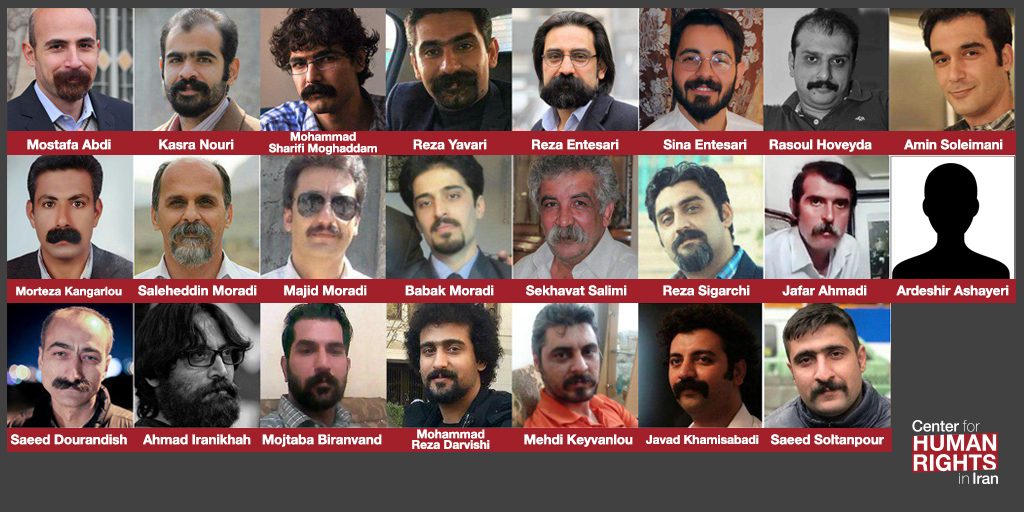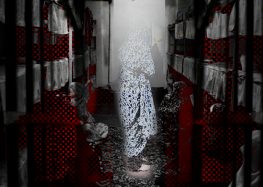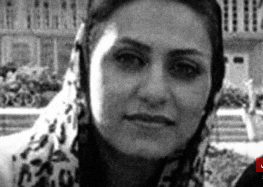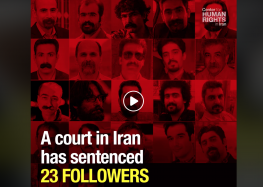Iran Appeals Court Upholds Lengthy Prison Sentences, Lashings Against 23 Dervishes

Sentences Range from Six to 26 Years Including Lashes
March 15, 2019 – The mass conviction of 23 dervishes of the Sufi Gonabadi Order to prison terms of up to 26 years as well as lashings further curbs religious freedom rights in Iran.
“It’s a clear assault on a religious minority,” said Hadi Ghaemi, the executive director of the Center for Human Rights in Iran (CHRI). “This was a political decision to send a signal that anyone who associates with Sufis in Iran risks paying heavy costs.”
The prison sentences ranged from six to 26 years and included 74 lashes, two years in exile, a two-year ban on social media and interviews, and a two-year prohibition on traveling abroad, according to Majzooban Noor, a Sufi-operated website that posts articles pertaining to the Gonabadi Order.
The United Nations has declared lashing a cruel and inhuman punishment tantamount to torture.
All the defendants were tried after being detained at a February 2018 protest in Tehran. Arguing that they were denied a fair trial, none of the 23 dervishes appeared in their court sessions as a form of collective protest, according to Majzooban.
“It is unwise to request an appeal from an unjust regime that mistreats the people,” they wrote in an open letter published in December 2018. “The Islamic Republic expected us to appear on the defendants’ stand … and bow to the judge’s nonsense dictated by the security authorities.”
Their names are: Kasra Nouri, Mohammad Sharifi Moghaddam, Mostafa Abdi, Reza Yavari, Reza Entesari, Sina Entesari, Morteza Kangarlou, Saleheddin Moradi, Majid Moradi, Babak Moradi, Sekhavat Salimi, Reza Sigarchi, Saeed Dourandish, Ahmad Iranikhah, Mojtaba Biranvand, Mohammad Reza Darvishi, Mehdi Keyvanlou, Javad Khamisabadi, Rasoul Hoveyda, Ardeshir Ashayeri, Jafar Ahmadi, Saeed Soltanpour and Amin Soleimani.
Mostafa Abdi received the harshest prison sentence of 26 years and three months followed by Kasra Nouri ad Mohammad Sharifi Moghaddam who received 12 years each.
The other defendants’ sentences are unclear. Some of the charges they were convicted of include “assembly and collusion against national security,” “disobeying the police” and “disturbing public order.”
A Tehran Appeals Court upheld the verdicts between March 9 and 12, 2019, reported Majzooban.
Why Were the Dervishes Convicted?
Followers of the Sufi Gonabadi order, referred to as dervishes, believe in a mystic interpretation of Islam.
The Islamic Republic’s ruling Shia establishment views any alternative belief system, including those seeking converts such as the Christian and Baha’i faiths, as a threat to Shia dominance in the country. Iranian authorities have imprisoned dervishes as well as expelled them from university for peacefully practicing their faith.
Hundreds of dervishes were detained and dozens hospitalized on February 19, 2018, at a street protest in Tehran after police opened fire at the demonstration, according to the Majzooban website.
The dervishes were protesting in front of the 102nd Police Station for the release of Nematollah Riahi, a fellow devotee who had been arrested outside the Tehran-based home of the Gonabadi Order’s spiritual leader, Nour Ali Tabandeh.
One dervish, Mohammad Raji, died in police custody and three policemen – Reza Emami, Mohammad Ali Bayrami and Reza Moradi Alamdari—died after being run over by a bus. Two members of the paramilitary Basij force (Mohammad Hossein Haddadian, second victim unidentified) also died during the unrest.
Friday prayer leaders in several provinces throughout the country condemned the dervishes as Tehran’s police chief promised death by hanging for whoever was responsible for the policemen’s deaths.
Mohammad Salas, a Sufi bus driver, was quickly tried and executed despite indications that his case was not handled fairly.
No one was ever held accountable for the death of Mohammad Raji, the dervish who family members say died as a result of “blows to his head” while in police custody.
Denial of Due Process, Disproportionate Punishment
In addition to Salas, many of the 300 dervishes detained at the February 2018 protests have been tried under national security charges, according to reports posted on the Majzooban website.
The court denied them access to counsel, telling them to choose their lawyers from a judiciary-approved list instead, reported Majzooban. Later reports indicate that some detainees chose lawyers from the list while others were eventually allowed to choose their own lawyers.
According to Majzooban, approximately 110 dervishes are currently behind bars in inhumane conditions in the Great Tehran Penitentiary as well as the Gharchak Prison for women located south of the capital.
In January 2019, female dervish Elham Ahmadi was sentenced to 148 lashes for speaking out about the denial of medical treatment and poor living conditions in Gharchak.
Some of the dervishes have reported being subjected to beatings by guards, denial of heating and food, and being forced into long periods of solitary confinement for protesting these conditions.
“The trials were conducted without due process and resulted in disproportionate and inhumane sentences,” said Ghaemi, referring to the lengthy prison terms and lashing sentences.
“The international community including the UN and EU countries should condemn the persecution of Sufis and all religious minorities in Iran,” he added.






